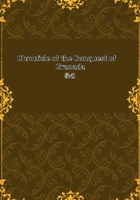
第188章
The royal procession advanced to the principal mosque, which had been consecrated as a cathedral. Here the sovereigns offered up prayers and thanksgivings, and the choir of the royal chapel chanted a triumphant anthem, in which they were joined by all the courtiers and cavaliers. Nothing (says Fray Antonio Agapida) could exceed the thankfulness to God of the pious king Ferdinand for having enabled him to eradicate from Spain the empire and name of that accursed heathen race, and for the elevation of the cross in that city wherein the impious doctrines of Mahomet had so long been cherished. In the fervor of his spirit he supplicated from heaven a continuance of its grace and that this glorious triumph might be perpetuated.*
The prayer of the pious monarch was responded to by the people, and even his enemies were for once convinced of his sincerity.
*The words of Fray Antonio Agapida are little more than an echo of those of the worthy Jesuit father Mariana (1. 25, c. 18).
When the religious ceremonies were concluded the court ascended to the stately palace of the Alhambra and entered by the great Gate of Justice. The halls lately occupied by turbaned infidels now rustled with stately dames and Christian courtiers, who wandered with eager curiosity over this far-famed palace, admiring its verdant courts and gushing fountains, its halls decorated with elegant arabesques and storied with inscriptions, and the splendor of its gilded and brilliantly painted ceilings.
It had been a last request of the unfortunate Boabdil--and one which showed how deeply he felt the transition of his fate--that no person might be permitted to enter or depart by the gate of the Alhambra through which he had sallied forth to surrender his capital. His request was granted; the portal was closed up, and remains so to the present day--a mute memorial of that event.*
*Garibay, Compend. Hist., lib. 40, c. 42. The existence of this gateway and the story connected with it are perhaps known to few, but were identified in the researches made to verify this history.
The gateway is at the bottom of a tower at some distance from the main body of the Alhambra. The tower had been rent and ruined by gunpowder at the time when the fortress was evacuated by the French.
Great masses lie around half covered by vines and fig trees. A poor man, by the name of Mateo Ximenes, who lives in one of the halls among the ruins of the Alhambra, where his family has resided for many generations, pointed out to the author the gateway, still closed up with stones. He remembered to have heard his father and grandfather say that it had always been stopped up, and that out of it King Boabdil had gone when he surrendered Granada. The route of the unfortunate king may be traced thence across the garden of the convent of Los Martyros, and down a ravine beyond, through a street of gypsy caves and hovels, by the gate of Los Molinos, and so on to the Hermitage of St. Sebastian. None but an antiquarian, however, will be able to trace it unless aided by the humble historian of the place, Mateo Ximenes.
The Spanish sovereigns fixed their throne in the presence-chamber of the palace, so long the seat of Moorish royalty. Hither the principal inhabitants of Granada repaired to pay them homage and kiss their hands in token of vassalage, and their example was followed by deputies from all the towns and fortresses of the Alpuxarras which had not hitherto submitted.
Thus terminated the war of Granada, after ten years of incessant fighting, equalling (says Fray Antonio Agapida) the far-famed siege of Troy in duration, and ending, like that, in the capture of the city. Thus ended also the dominion of the Moors in Spain, having endured seven hundred and seventy-eight years from the memorable defeat of Roderick, the last of the Goths, on the banks of the Guadalete. The authentic Agapida is uncommonly particular in fixing the epoch of this event. This great triumph of our holy Catholic faith, according to his computation, took place in the beginning of January in the year of our Lord 1492, being 3655 years from the population of Spain by the patriarch Tubal, 3797 from the general deluge, 5453 from the creation of the world, according to Hebrew calculation, and in the month Rabic, in the eight hundred and ninety-seventh year of the Hegira, or flight of Mahomet, whom may God confound! saith the pious Agapida.